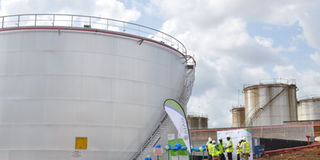Prime
Vivo unveils Shs5b fuel reserves

Officials stand near one of the newly-commissioned tanks in Kampala yesterday. The reserves are meant to enhance supply in times of fuel shortage. PHOTO BY RACHEL MABALA
What you need to know:
The over 10 million-litre tanks are meant to boost the country’s supplies in times of shortage
KAMPALA
Ministry of Energy officials have said they learnt lessons from the recent political and economic upheavals in neighbouring Kenya and are supporting measures to boost the country’s fuel reserves.
The head of Petroleum Quality Assurance in the ministry, Mr Spero Byokunda, said they have finished refurbishing the Nakasongola fuel reserves and distributors can now take over their usage.
Speaking at the commissioning of the 10 million-litre capacity tanks for Vivo Energy in Kampala yesterday, Mr Byokunda, revealed that they have commissioned the process for a contractor to revamp the Nakasongola reserves which have remained unutilised for a long time.
“The fuel market is growing at 7 per cent compared to three years ago, and the importance of petrol has doubled requiring more storage space,” Mr Byokunda said.
“So we invite you to make use of our Jinja fuel reserves which we have finished renovating,” he added.
Fuel boost
Vivo Energy, which operates about 116 fuel stations countrywide, unveiled the two tanks, each with capacity of five million litres as part of the initiative to boost fuel sustainability in the country.
Vivo managing director Hans Paulsen, said the market grew at a 5 per cent rate last year; and the projections are similar for this year which calls for urgent measures on the supply side. He said that these additional storage tanks, which cost $2 million about Shs5 billion) when full, can sustain the country for 25 days forward in times of shortage.
“Being land-locked, Uganda faces transport infrastructural challenges, which make the process of supply difficult. The Kenya Pipeline also experiences breakdowns that affect supply reliability into the market but at Vivo, our priority is to maintain a constant supply of Shell superior fuels to our customers,” he said.
The Vivo Energy Group CEO, Mr Christian Chammas, said: “Going forward, we will invest in excess of $250m over the next three years in Africa to grow our business and contribute to economic growth.”
UGANDA'S FUEL CONSUMPTION STATISTICS AND INCREASING DEMAND
In 2008, it was estimated that Uganda consumed about 13,000 barrels of oil a day and spent $400 million annually on petroleum imports. Consumption, largely based on transportation, rose rapidly in the 1990s; rising by an average of 14 per cent per year from 1993 to 1996, and at about 6 per cent per year since 1997. Uganda imports all its petroleum products although some local production is expected to begin soon.
Imports come primarily through Kenya (85 per cent) and Tanzania (15 per cent) via trucks.
According to Ministry of Energy statistics, about 60 million litres of fuel are consumed every month with fuel also topping Uganda’s import bill with estimations of around $400 million (about Shs1 trillion).




